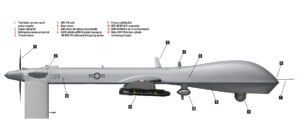Iraq War Ends; Vietnam Comparisons Continue
The departure of the last U.S. soldiers from Iraq in December marked the close of a nearly nine-year war that began in March 2003 with missile strikes on Baghdad aimed at ousting President Saddam Hussein. The war cost some 4,500 American lives, and tens of thousands of Iraqis perished. It ended with Iraq still struggling to maintain a fragile democracy wracked by sectarian violence.
Since the conflict started, scholars, historians, politicians, pundits and the public have debated the similarities and differences between the Iraq and Vietnam wars.
Whatever the differences, both U.S. wars saw troops withdrawing and returning home quietly—and in the current situation, being redeployed to Afghanistan. And in both Iraq and Vietnam, unresolved conflicts and uncertainty on the ground remained in the wake of the withdrawals.
To mark the end of each war, Presidents Richard Nixon and Barack Obama addressed the nation. Nixon spoke from the White House on March 29, 1973:“Tonight, the day we have all worked and prayed for, has finally come. For the first time in 12 years, no American military forces are in Vietnam.”
Obama, in his speech given at Ft. Bragg on Dec. 14, 2011, said: “Today, I’ve come to speak to you about the end of the war in Iraq. Over the last months, the final work of leaving Iraq has been done.”
The speeches of the two presidents bore other striking similarities:
Richard Nixon: On this day, let us honor those who made this achievement possible: those who sacrificed their lives, those who were disabled, those who made every one of us proud to be an American as they returned from years of Communist imprisonment, and every one of the 2 1/2 million Americans who served honorably in our Nation’s longest war. Never have men served with greater devotion abroad with less apparent support at home.
Barack Obama: For nearly nine years, our nation has been at war in Iraq. And you — the incredible men and women of Fort Bragg—have been there every step of the way, serving with honor, sacrificing greatly, from the first waves of the invasion to some of the last troops to come home.
Nixon: The 17 million people of South Vietnam have the right to choose their own government without outside interference, and because of our program of Vietnamization, they have the strength to defend that right.
Obama: We’re leaving behind a sovereign, stable and self-reliant Iraq, with a representative government that was elected by its people. We’re building a new partnership between our nations.
Khmer Rouge Leaders Refute Genocide Role, Blame the United States
While three former Khmer Rouge leaders on trial in Phnom Penh for atrocities committed during their reign in Cambodia have denied all charges of genocide, war crimes and crimes against humanity, two of the defendants have blamed the U.S. intervention and secret bombing of Cambodia for the Khmer Rouge’s rise to power following the Vietnam War. The defendants, Nuon Chea, Khieu Samphan and Ieng Sary, all now in their 80s, held key positions in the Khmer Rouge regime in 1975-79, when 1.7 million Cambodians were killed. Their leader, Pol Pot, who died in 1998, had denied guilt for the brutalities of the group as well.
This is the second case heard by the Extraordinary Chambers in the Courts of Cambodia. In the tribunal’s first case, in 2010 Kaing Guek Eav, the commandant of the main Khmer Rouge prison, was given a 35-year sentence, which commuted to 19.
Khieu Samphan, the regime’s head of state, raised questions of the U.S. bombardment of Cambodia that preceded the Khmer Rouge’s rule. “You seem to forget that between January 1970 and August 1973…the United States carpeted the small Kampuchean [Cambodian] territory with bombs,”Samphan stated.“Could you imagine what my country faced after such a bloody killing and war?”
Michiel Pestman, a lawyer representing Nuon Chea, issued a statement saying that Henry Kissinger, the former U.S. secretary of state, should be put on trial. “Most historians agree, that without this American intervention, the Khmer Rouge would not have been able to seize power,” Pestman said. “Without Kissinger, we would not be here today.”
Hagel Brothers Boost Library of Congress Vietnam Vet Oral History Effort
Inspired in part by the upcoming 50-year commemoration of the start of the Vietnam War, former Nebraska Sen. Chuck Hagel and his brother Tom joined forces with the Library of Congress in December to launch a new initiative to collect Vietnam’s oral histories for the library’s Veterans History Project (VHP).
The brothers, who served in the same squad in Vietnam in 1968, submitted more than 20 hours of footage of them that Nebraska Educational Telecommunications recorded in 1999 for a one-hour documentary movie. In the movie, Chuck and Tom, a law professor at University of Dayton, return to Vietnam to where they frequently walked point together, and where they were both wounded and each saved the other’s life.
While VHP has a 2002 interview of Sen. Hagel, this contribution also offers the thoughts of Tom, who was frustrated and angry upon returning from the war.
“Their rare experience serving together as brothers, then returning to Vietnam following their service, added perspective to their very different professional lives,” said VHP Director Robert Patrick. “This is, we hope, just the beginning of a several-year initiative to highlight the over 13,000 collections from Vietnam veterans already in the VHP collection and the need to collect more.”
As a senator, Chuck Hagel helped sponsor the legislation that created the Veterans History Project in 2000. Since then it has collected more than 78,000 interviews from veterans of World War I through the wars in Iraq and Afghanistan. For more about VHP: www.loc.gov/vets
War Pen Pals Back in Touch
In 1965 Alan Horton wrote a letter, as part of a sixth-grade project, to a soldier in Vietnam and it reached Paul Guglietta, who was recuperating from shrapnel wounds he received in the Battle of Ia Drang. Guglietta wrote back to Horton in Grand Haven, Mich., and the two exchanged a few more letters before they lost touch.
Last November, Horton was watching a TV program about the war and Guglietta’s name popped into his head. Horton went online and searched for a viable address. On Nov. 13, 2011, the 45th anniversary of the Battle of Ia Drang, Horton mailed letters to three Paul Gugliettas. Four days later, Guglietta, 74, retired in Florida, called him back.
The pair now correspond through e-mails and telephone and have a new shared goal: to work within their communities to urge schoolchildren and their teachers to write to Americans serving overseas.
Originally published in the April 2012 issue of Vietnam Magazine. To subscribe, click here.




